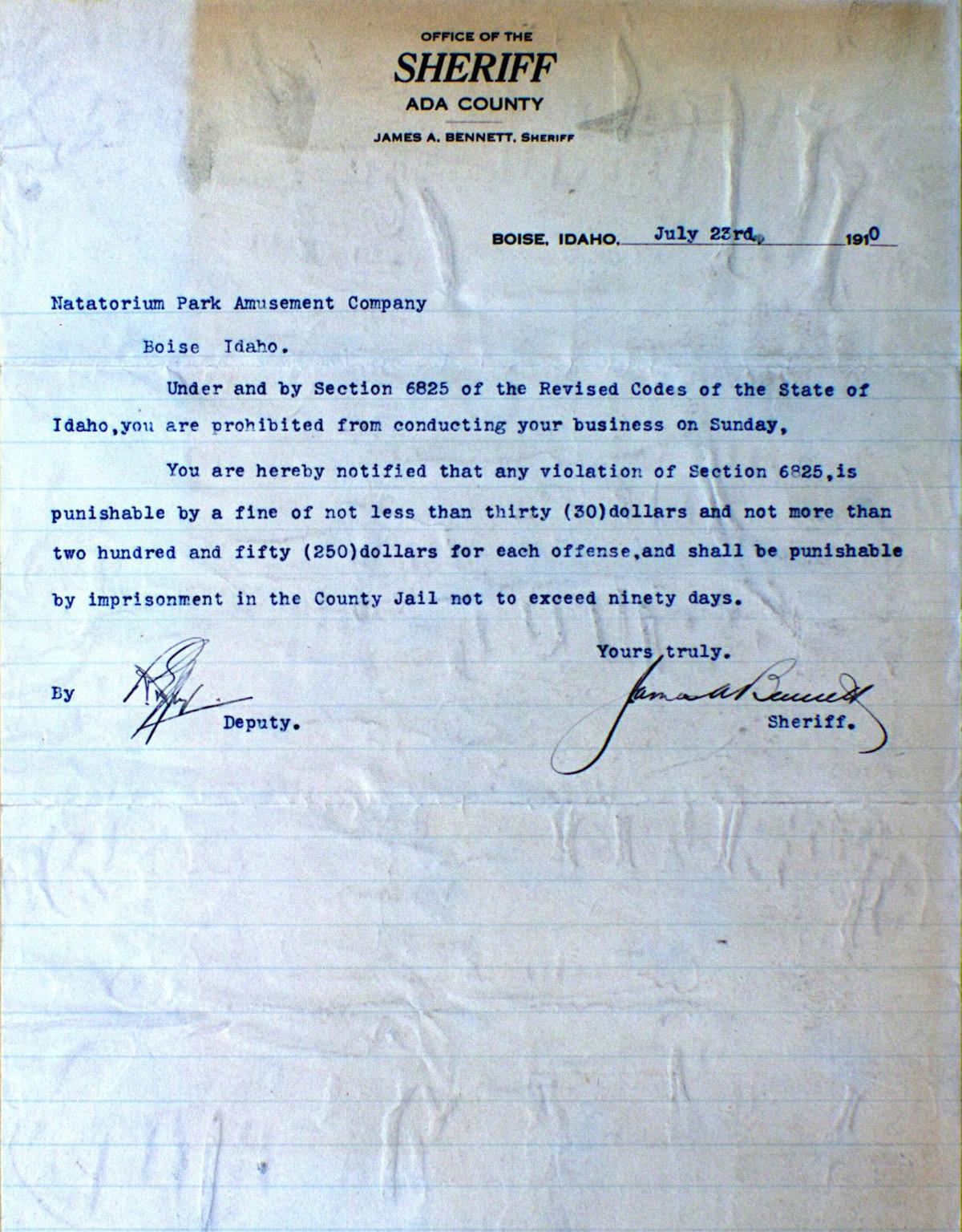By Rick Just History writer

The manager of the Natatorium Park Amusement Company got a warning before his arrest for violating Idaho’s Sunday Rest law.
Image from the Bob Hartman Collection.
I did the research for this column on a Sunday. I wrote it on another Sunday. It will appear on yet another Sunday. Does that make me a scofflaw?
No, not in 2020. In 1907 the answer would not have been so clear.
Many Idahoans would rather the state name not even appear in the same sentence as California. It will appear that way here, twice. Idaho and California were the last two states in the nation that did not have a Sunday Rest law on the books in 1907. That was soon to change.
Sunday Rest laws were put in statute to codify a day of rest from secular labor. The International Reform Bureau was a group promoting such laws nationwide, and Idaho was in their sights. Dr. G.L. Tufts, of Portland, was the group’s lead lobbyist. He took his job seriously enough to get arrested for it.
Dr. Tufts became the first to test a law then recently passed by the Idaho Legislature that prohibited lobbying in the statehouse. Tufts was arrested on a Wednesday after repeated warnings that his conversations with lawmakers were prohibited. Presiding over the case a Justice Savidge released the man that Friday on the grounds that “Your thought (was) kindly and brotherly, nothing else, and your motive philanthropic. Your intention was far from anything criminal and you may go on your way.”
The law prohibiting lobbying didn’t last, perhaps due in part to this quick dismissal. The bill Dr. Tufts lobbied for got considerable support from the citizenry in the form of petitions. As a sample, there were 41 signatures from St. Anthony, 126 from Boise, and, notably, 310 from Kellogg. The Silver Valley, which includes Kellogg, was deeply torn by the proposed law.
Mine owners pointed out the hardship of shutting down their operations one day each week and missing out on the soaring silver prices at the time. Bar owners, especially in Wallace, openly vowed to flout the law if it passed.
It passed, and now it was up to law enforcement to see that citizens adhered to it. Whatever that meant. These days Pandora is a music streaming service. Back then it was a proverbial box filled with squirming issues released upon passage of the Sunday Rest law. If people couldn’t gather for a play on Sunday, could they gather at church? Most agreed they could, but in Boise the line between entertainment and religion was blurred when the county prosecutor shut down a Passion Play on a Sunday at the YMCA for violating the law.
As Jimmy Buffett once sang, “There’s a thin line between Saturday night and Sunday morning.” True to their word, bar owners in Wallace refused to shut down when Saturday nights rolled into the wee hours of Sunday. They were arrested and rearrested. They tried closing up the front of their establishments and sneaking people in the back.
Enforcement of the law was often lax. When three saloon keepers in Cottonwood stood trial, they were sentenced to spend one minute in the county jail at Grangeville.
In Boise the manager of Riverside Park was arrested for showing a theatrical production on a Sunday. The law specified a $100 fine for such an affront. Other Boiseans were arrested for operating a shoeshining stand, running a steam bath, and for selling produce. The prosecutor in Ada County got complaints about the Boise Commercial club and the Elks’ club conducting business over the bar on Sundays. He determined that since they were private enterprises the law did not apply.
And that was the rub. Deciding when the law applied and when it didn’t became an endless question. The manager at the Natatorium and the White City Amusement Park made his own determination about what could operate and what couldn’t. Predictably he guessed wrong, at least according to the Ada County Prosecutor.
In July of 1910, the Nat manager, G.W. Hull was arrested for running a scenic railroad around the White City Amusement Park on a Sunday. An immediate uproar commenced, with people questioning the fairness of arresting a train operator while leaving operators of the Interurban trolley line free to take people all around the valley on scenic excursions.
The scenic railroad arrest became a test case that went to the Idaho Supreme Court. The court ruled in favor of Hull, stating that amusements not “immoral, corrupt or boisterous” did not break the law.
Interpretations and misinterpretations continued for years with enforcement growing increasingly lax. The Idaho Legislature finally repealed the Sunday Rest law in 1939. So, today you’re welcome to go to church, watch a Passion Play — or any kind of play — as well as put in a hard day’s labor. You’re also welcome to rest.
Source
No comments:
Post a Comment